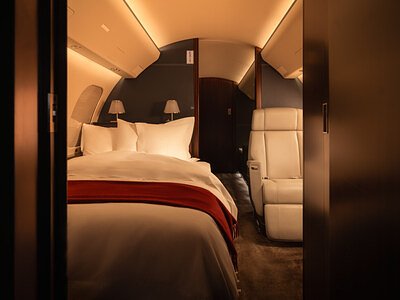
VistaJet Bets on Biohacking: New 'Sleep Program' Aims to Turn Flights into Recovery Zones
Private jet operator VistaJet launches a science-backed 'Sleep Program' designed to optimize passenger recovery during travel. Is this the future of luxury air travel – and can biohacking truly conquer jet lag?
VistaJet Bets on Biohacking: New ‘Sleep Program’ Aims to Turn Flights into Recovery Zones
London, UK – November 12, 2025 – Private aviation leader VistaJet is taking a novel approach to luxury travel, launching a new ‘Sleep Program’ designed to transform long-haul flights from disruptive experiences into restorative recovery zones. The program, built around cutting-edge sleep science and spearheaded by longevity expert Dr. Peter Attia, aims to mitigate the debilitating effects of jet lag and optimize passenger wellbeing.
For years, private jet travel has been synonymous with comfort and convenience. Now, VistaJet is positioning itself at the forefront of a new trend: biohacking – leveraging scientific principles to optimize human performance. The Sleep Program isn't just about plush seating and gourmet meals; it’s about strategically manipulating light, nutrition, and the cabin environment to align with passengers’ circadian rhythms.
“The goal isn't just to make flights more comfortable, but to actively improve wellbeing during travel,” explains a VistaJet spokesperson. “We’re recognizing that travel doesn’t have to be a net negative for health. It can be an opportunity for recovery and optimization.”
The Science Behind the Sleep Program
Jet lag is caused by a disruption of the body’s internal clock – the circadian rhythm – which regulates sleep-wake cycles, hormone release, and other essential functions. The Sleep Program tackles this issue on multiple fronts. At its core is a focus on circadian alignment - the process of resetting the body's internal clock to a new time zone.
“Light is the most powerful external cue for our circadian clock,” explains a sleep researcher consulted for this article. “The program’s strategic use of lighting – adjusting intensity and color temperature throughout the flight – is a key component.” The program utilizes dimmed, red-toned lighting during sleep periods to encourage melatonin production, and gradually increases blue-toned light as passengers approach their destination to promote alertness.
But light isn't the only factor. Nutrition also plays a critical role. VistaJet’s onboard chefs work with nutritionists to create menus designed to support circadian rhythms, with a focus on meal timing and composition. “The timing of when and what you eat can significantly influence your sleep-wake cycle,” says one nutritionist involved in the program. “We’re focusing on incorporating foods rich in tryptophan and melatonin, and strategically timing meals to support the body’s natural rhythms.”
Beyond lighting and nutrition, the program also emphasizes environmental control, with cabin temperature, humidity, and noise levels carefully regulated to create an optimal sleep environment. Trained cabin hosts are now equipped to manage these factors, adjusting conditions to promote relaxation and recovery.
Beyond Comfort: A Holistic Approach to Wellbeing
VistaJet’s commitment extends beyond the flight itself. The program is integrated with partnerships with luxury wellness destinations like Lanserhof, Six Senses, and Chiva-Som, allowing passengers to seamlessly continue their recovery journeys upon arrival. These partnerships offer a range of services, from detox programs and spa treatments to personalized health assessments and preventative care.
“We see this as a holistic approach to wellbeing,” explains a VistaJet representative. “It’s not just about getting from point A to point B; it’s about ensuring our passengers arrive feeling refreshed, rejuvenated, and ready to perform at their best.”
Is This the Future of Luxury Travel?
The Sleep Program represents a significant departure from traditional luxury travel, which has often prioritized comfort and convenience over proactive health management. While other private jet operators offer luxurious amenities and comfortable sleeping arrangements, VistaJet is unique in its commitment to scientifically-backed sleep optimization.
“There's a growing awareness among high-net-worth individuals about the importance of optimizing their health and wellbeing,” explains a travel industry analyst. “They're increasingly willing to invest in experiences that promote preventative care and enhance their performance.”
However, some remain skeptical about the program's effectiveness. “While the science behind it is sound, it’s difficult to say how much of an impact it will actually have in a real-world setting,” says a sleep specialist. “Factors like stress, pre-existing sleep disorders, and individual variations can all influence the outcome.”
Despite these challenges, VistaJet’s Sleep Program signals a potential shift in the luxury travel landscape. As the demand for personalized wellbeing experiences continues to grow, other operators may be forced to follow suit, integrating scientific principles into their offerings.
“This is more than just a trend; it’s a fundamental change in the way people are approaching travel,” says a VistaJet spokesperson. “We believe that the future of luxury travel is about proactive health management and personalized wellbeing experiences. We're committed to leading the way.”
The cost of the Sleep Program is currently included within VistaJet’s existing membership and on-demand charter offerings, with no separate pricing structure announced. The operator plans to continuously refine the program based on passenger feedback and scientific advancements, solidifying its position as a pioneer in the evolving world of luxury air travel.
